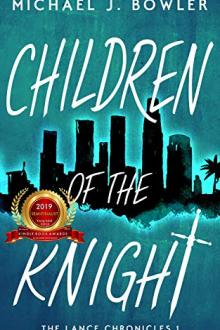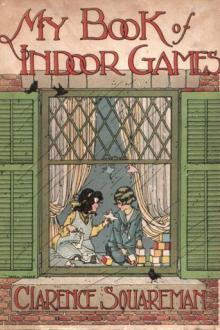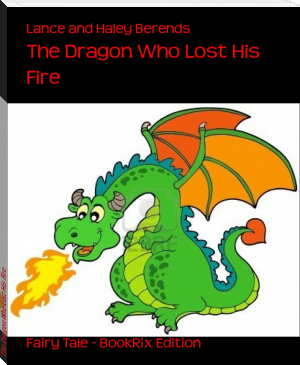Children of the Knight - Michael J. Bowler (best books to read non fiction .txt) 📗

- Author: Michael J. Bowler
- Performer: -
Book online «Children of the Knight - Michael J. Bowler (best books to read non fiction .txt) 📗». Author Michael J. Bowler
“Can’t help you there, partner,” Ryan offered, popping some gum into his mouth. He needed to break this pencil-chewing habit somehow, and he figured if gum worked for cigarette smokers, it might work for pencil chewers, too.
Gibson nodded. “Yeah, you and the ex were smarter than me and mine.”
“Does he keep in contact with Sandra when he’s out?” Ryan asked, more to help his partner than out of any real interest. Kids were nothing but potential criminals in his book.
Shouldn’t be seen nor heard till they turned twenty-one.
Gibson shook his head, taking a swig of his Diet Coke.
Ryan recalled with amusement when Gib had sworn off coffee three years back, but now he had the Diet Coke addiction. It never ended.
“Isn’t he eighteen soon?” Ryan offered hopefully.
“Nope,” Gibson replied. “Two more years.”
“Too bad.”
“You know what bugs me the most?” Ryan looked up and pretended he was interested. “He’s embarrassed that I’m a cop. Says his friends give him crap about it.”
Ryan frowned. Was that a good response? “Makes you wonder who his friends are, huh.”
“Yeah, it does. He never brings ’em round. I don’t know, Ry. You bust your butt for these kids, and they don’t appreciate it. Hell, I’m out there cleaning up this city so his kids’ll have a better life, and he doesn’t even care.”
Ryan eyed his troubled partner a moment. “You know I know nothing about raising kids, but maybe yours doesn’t want you to spend so much time saving the city and give some of that time to him.”
Gibson jerked his head up from his Diet Coke, his face stormy.
“Go home, Gib,” Ryan offered. “There’s nuthin’ goin’ on here. Maybe Justin’s there, and you guys could go get a pizza or something.”
Gibson set down his empty soda can and reached for the photo on his desk. He gazed at the face of a handsome young boy. He set the photo down and rose from his chair, snatching his jacket off the back of it. “I am gonna head home, Ry. Call if anything pops.”
“Will do,” Ryan agreed, and Gibson was out the door in a flash.
Kids, Ryan thought. Thank God I don’t have any!
The nondescript warehouse appeared to be a bland and ordinary four-story building. That’s just how Mr. R. and Mr. L. wanted it to appear. Just one of dozens of similar buildings in Los Angeles that wouldn’t attract any particular notice from police or the populace at large.
Of course, their real names were unknown, and to all the boys who ran their drugs on the street they were known simply as Mr. R. and Mr. L. To the world at large, both men—under different identities— were prominent, successful, and powerful businessmen.
Mr. R., third generation Mexican, had made his fortune in real estate and land holdings. He had Mayor Villagrana in his pocket, and thus the mayor’s full cooperation. His overly generous monetary support of Villagrana’s campaign got him whatever he wanted when it came to skipping environmental standards or bypassing zoning laws. He owned the mayor.
Mr. L., from Hong Kong, had been working with Mr. R. for several years. Wildly successful in neo-capitalist China, he had gone into the drug business with Mr. R. because it was astoundingly lucrative, with very little overhead. As an importer of fine china and works of art, it was easy to smuggle the drugs past customs. A few well-placed bribes always did the trick. Mr. R. had reasoned, rightly so, that all the incompetence from the Mexican drug cartels these days made them too risky a proposition for importing drugs.
But the US government hardly looked at China regarding drug trafficking, and, even when they did, the smuggling was surprisingly easy, and the overly bloated bureaucracy stumbled over itself with ineptitude. LA was such an addicted city that both men made a fortune under the table almost equal to what they made over it, without the annoying matter of taxes or tariffs to pay.
Of course, nowadays, many people ran little drug rings out of their own homes, so whenever possible, the partners subsidized these neighborhood operations, took the lion’s share of profits, and no one was the wiser. Meth was hot, and of course, cocaine and marijuana never lost their appeal. Mr. R., in particular, was thrilled to see heroin make a comeback. A strongly addictive drug, it promised years of money rolling in from whoever used it, until the inevitable overdose, of course.
A sad, but necessary part of the business.
Justin stood before Mr. R., as always noting the slicked back hair, finely chiseled cheekbones, and an extensive collection of gold jewelry. He particularly fancied a large, ornate, twenty-four carat gold ring on the index finger of Mr. R’s right hand.
As was his custom, standing beside R.—he never sat in the presence of flunkies or dope peddlers—was Mr. L.—a small guy wearing exotic wire-rimmed glasses, dressed a fancy business suit, and always bearing an impassive expression that was scary.
Alongside Justin was Dwayne.
Mr. R. had been very unhappy that the two boys hadn’t killed Lance that night in the alley, and Justin had genuinely feared for his life. But when Mr. R. and Mr. L. heard about this mysterious figure in knightly armor, they’d become intrigued. From that night onward, they’d been fascinated by the news reports of Arthur’s street fight with the LAPD and had instructed Justin, Dwayne, and all their runners to find out what they could about this man: where he hid out, what his plans were, what impact he might be having, negative or positive, on their street business.
“Anything new, boys?” R. asked in that silky-smooth voice of his.
Dwayne shook his head, but Justin said, “My dad and his partner are trying to nail the guy, but can’t find his ass anywhere.”
“Darnell been goin’ and meetin’ the dude somewhere,” Dwayne offered, twitching and fidgeting, “with a bunch a his homies, but he won’t tell me nuthin’.”
“You both should have accepted the man’s invitation in Griffith Park,” Mr. L. stated in a cold, dispassionate voice, causing Justin to squirm.
“Your second mistake in a matter of weeks,” Mr. R. reminded him sternly. “Do not make a third.”
Mr. L. snapped his fingers, and several young Asian men hurried forward with bags of white powder, which Dwayne and Justin quickly stuffed into their rather large backpacks. To make himself appear harmless, and to offset his boxer- like build, which intimidated many children, Justin always sported a child’s backpack with cartoon characters, which seemed to amuse Mr. R.
“Now, boys,” Mr. R. concluded when they’d slung the packs over their shoulders, “I want more information on this so-called King Arthur, and I want it soon. He’s already stolen some of my gang members, and I can’t have that, can I?”
Justin shook his head, and noted Dwayne doing the same.
Mr. R. flashed his perfect teeth. “Do not disappoint me.”
The boys nodded nervously.
“You may go,” Mr. L. commanded, and Justin sure needed no further urging. He turned and followed Dwayne as fast as possible out of the office. Both of them scuttled down four flights of stairs, and bolted out the back exit into a small, unseen alley.
Day by day, Arthur instructed his knights-to-be, and day by day they grew stronger in weaponry and in chivalric knowledge. Even the gang members had thus far adhered to Arthur’s rule of no street rivalries entering his safe haven. They’d also shown vast growth, both in civil behaviors, and more importantly, in their strong desire to follow a better path in life. True, their learned tendencies toward arrogance and domination over the weak were traits that might never fully disappear, but in their willingness to accept a new way of thinking, the boys were becoming more adept at controlling those tendencies. And that was all Arthur could ask of anyone.
“One day soon,” he told the assemblage, “those who wish and who be worthy shall be knighted by me into this new Round Table. Yes, we do not have a physical table, but the symbol of that round table be crucial to our success. None of us can strive for greatness above and beyond any other. The needs of the entire company be of greater import, remember. The code of chivalry, to which every knight must swear fealty, requires us keep faith in God and each other, to fight for all, not merely a few, to avoid unfairness at all costs, and to always speak the truth. Can ye all gathered here accept this code and strive to the best of your ability to live it?”
There was silence from the assembled kids as they digested Arthur’s words. The code was extreme for most of them. Especially for Esteban and the other gang members who’d spent their young lives ignoring rules and laws—lying, partying, slanging, running their own program.
Lance leapt to his feet and cried out, “I can, sire!”
Within the crowd, Mark jumped up as well, grinning at Lance. “And I, sire!”
Next stood Jack, glancing a moment at Mark, whose gaze was locked on Arthur, before turning to face the king. “And I.”
Reyna stepped forward in the rear, holding her bow above her head in salute. “And I, Arthur.”
Esteban threw her a smile before he, too, rose to his feet and stepped forward. “And I.”
Within moments, the entire chamber had risen to its collective feet, shouting in unison, “And I, sire!”
Arthur turned to Lance with a smile and a nod, which Lance returned with a slight bow. Soon, Arthur knew, his army would be ready, and his crusade could truly commence.
Jenny was attempting, and failing, to teach Romeo and Juliet to her ninth graders. She hated the slavish way the school and the district forced teachers to adhere exactly to the state-mandated curriculum. Much as she loved Shakespeare, plays were meant to be seen, not read, especially with such arcane English that it was practically a foreign language. As if those paper pushers in Sacramento had any idea what her students needed to learn to be successful in life.
All it would take was for school districts to tell the state, and the feds, to go take a hike. If every district in the state did that, what could Sacramento do, give everybody detention? They couldn’t cut off funding because that would be a public relations nightmare. Sadly, nobody in this state had the intestinal fortutude to fight back. Including her, unfortunately.
At present, a boy named Tony and a girl named Maria struggled to read aloud some passages from the Shakespeare play, mangling the dialogue worse than any actor on those cheesy science fiction movies she sometimes watched to kill time.
The other students paid little or no attention. Their minds were either wandering, they were doodling, playing with their cell phones, or otherwise tuning out the horrific acting of their fellow students. Quite frankly, Jenny didn’t blame them.
Tony read, “I take thee at thy word: call me but love, and I’ll be new baptiz’d; henceforth I never will be Romeo.”
Maria responded after a pause, “What man art thou that thus be screen’d in night so stumblest on my counsel.”
During this recitation of lines, Jenny wandered down the aisle to a heavy boy wearing black and snagged the car magazine he’d been looking at. “Hey!” the boy exclaimed indignantly, “That’s mine!”
“You can have it back after class,” Jenny said in a quiet voice. “Now pay attention.”
“What for?” the boy asked with disdain. “Nobody talks like that no more.”
Now Maria piped up with, “Wait a minute, I lost my place.”
A few





Comments (0)